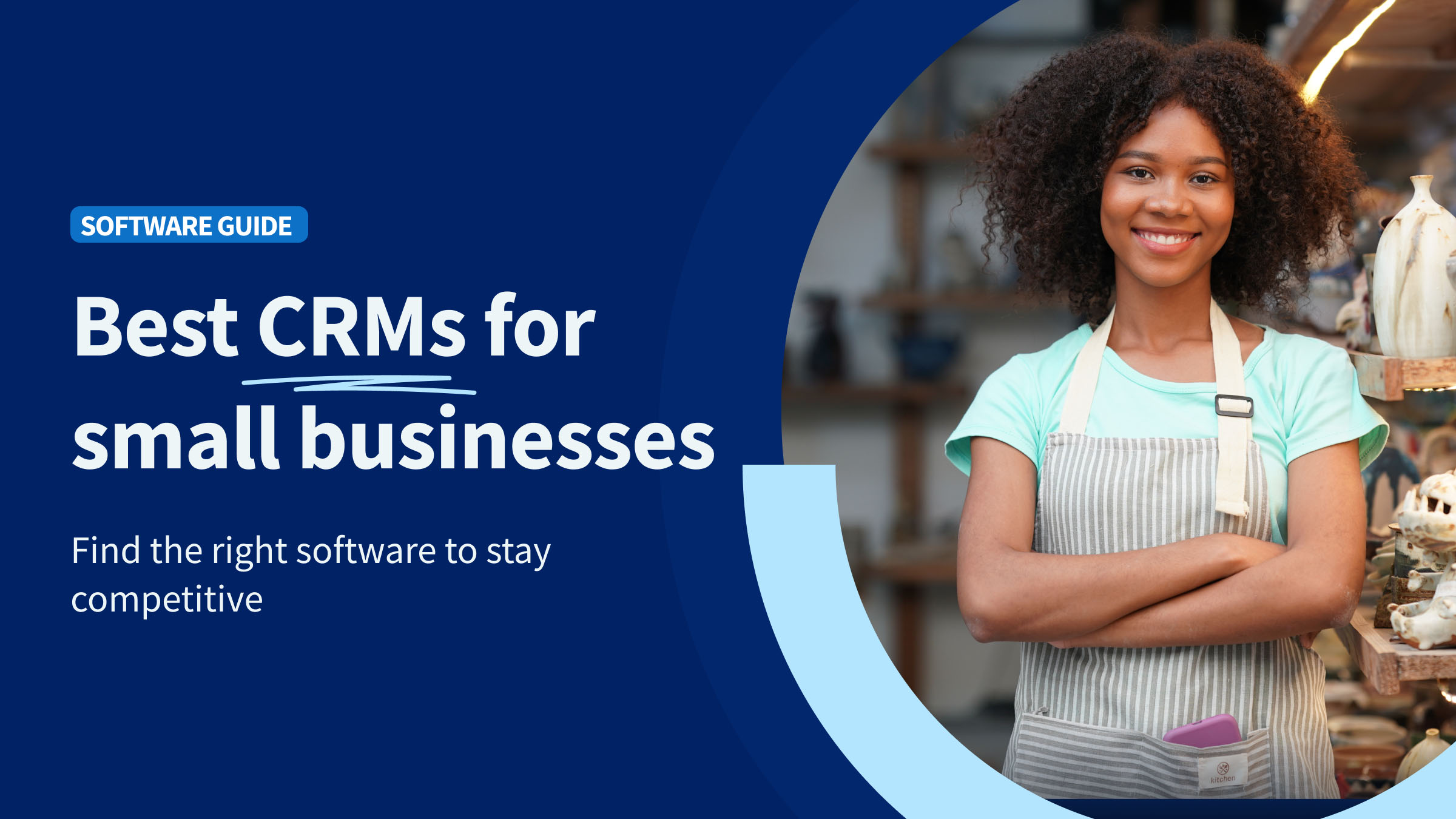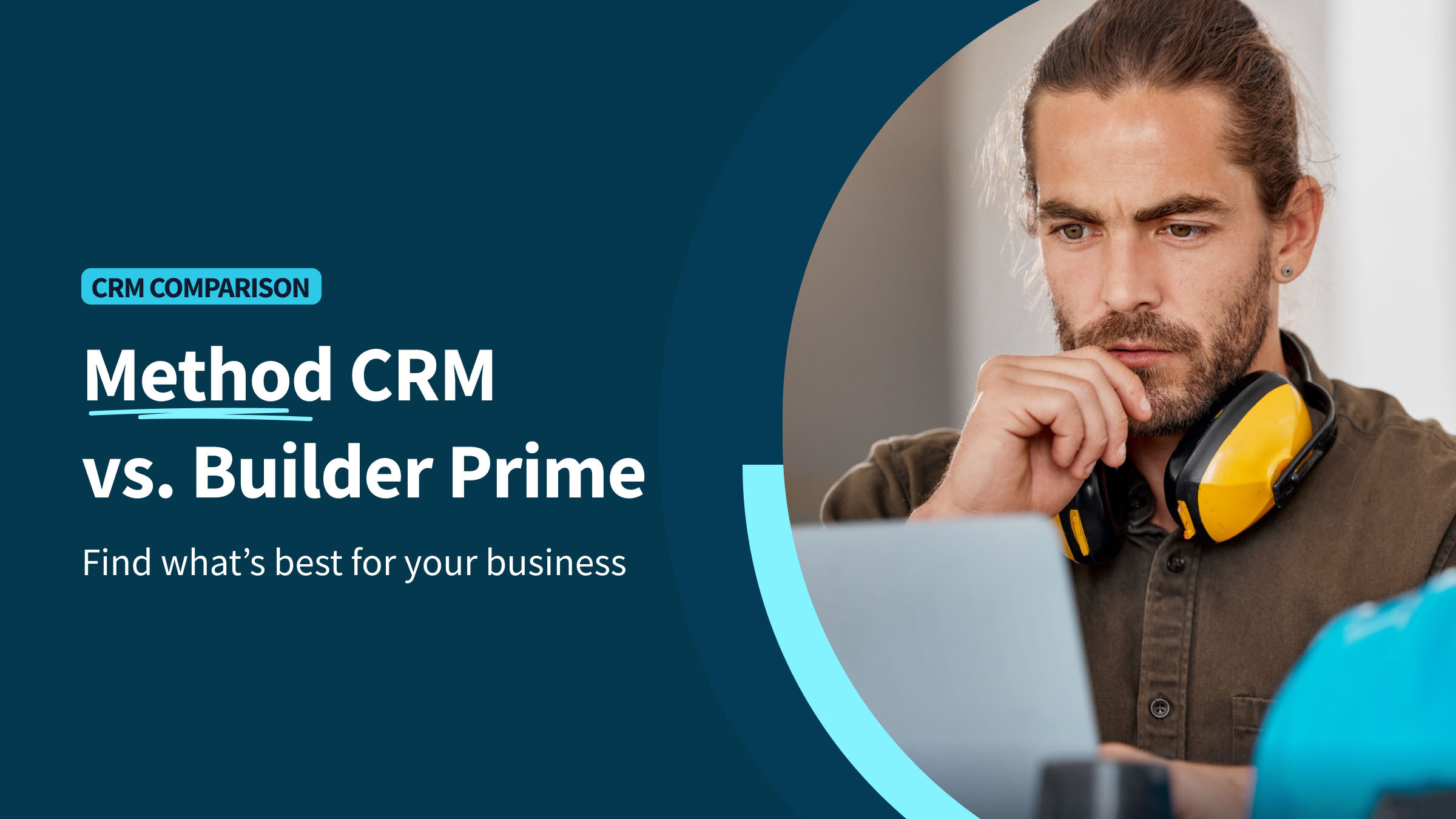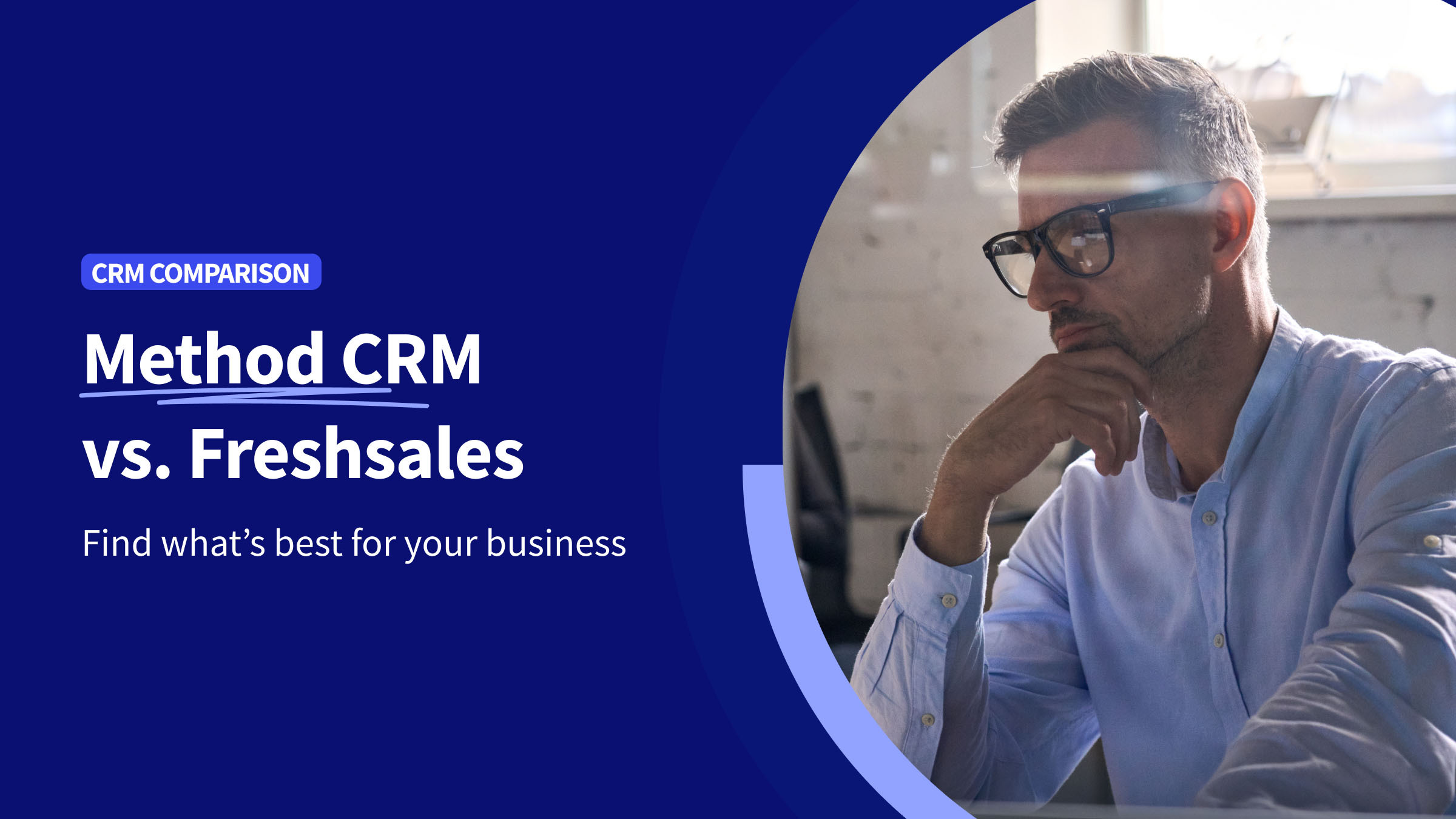When you’re running a small business, it’s important to stay organized and connected with your customers. That’s why all small businesses can benefit from a customer relationship management (CRM) system. The best CRMs help you manage leads, automate repetitive tasks, and provide insight into your sales pipeline so you can grow your business with less heavy lifting.
Method is a CRM designed with small businesses in mind. It offers deep integration with QuickBooks and Xero, along with automation tools and customization options that help simplify day-to-day operations. In this guide, we’ll look at the best CRM systems for small businesses —including Method—highlighting features, pricing, and benefits to help you find the right fit.
Key takeaways
- CRM systems help small businesses stay organized, build stronger customer relationships, and drive growth.
- The best CRM for your business depends on your specific business needs.
- Method CRM offers real-time, two-way syncing with QuickBooks and Xero, as well as customizable workflows.
- Other top CRMs in 2025 include HubSpot, Salesforce, Zoho, and Monday.com.
What is a CRM system?
A customer relationship management (CRM) system is software that handles your company’s relationships and interactions with customers. It helps you manage and organize your customer data, track your sales cycle, and improve communication with leads and clients.
The main purpose of using a CRM is to improve business relationships so that you can grow your business by organizing, storing, or managing your customer contact information.
A CRM solution lets you simplify processes, stay connected with customers, and increase profitability overall.
Benefits of CRM systems for small business
CRM systems are a must-have for any small business that wants to stay competitive. Here are some of the benefits:
- Centralizes customer information (everything is in one place)
- Gives you a 360 degree view of customer data, interactions, and transactions
- Simplifies data collection, analytics, and report generation
- Identifies and converts qualified leads into customers
- Offers insights to drive your business forward
- Automates the boring and repetitive manual work no one likes doing
What are the components of ideal CRM systems for small businesses?
With the vast variety of CRM systems on the market, it’s natural to wonder what it is that separates the best from the rest.
There are several key components that are vital for small businesses. These include:
- Sales automation to speed up processes such as sales forecasting
- Lead management to keep track of prospects and nurture them
- Marketing capabilities to promote your company and advertise its offerings
- Customer service features to address customer needs
- Business reporting and analytics to gain important insights
How we chose the best CRM systems for small business
Below is a list of the top 12 best CRM systems for small businesses.We chose the best small business CRM software based on:
- Features
- Price
- Pros and cons
Selecting the right CRM system will depend on your business needs, but the top ones are listed below to guide you.
The 12 best CRM systems for small businesses
Here are the best CRM systems for small businesses.
| CRM | Best for… |
| Method | Small businesses using QuickBooks or Xero. |
| Monday.com | Teams that need visual project views and collaboration. |
| Zendesk Sell | Sales teams focused on workflow efficiency. |
| Insightly | Businesses that combine CRM with project management. |
| Freshsales | Companies that need built-in AI scoring and automation. |
| Salesforce CRM | Organizations that need a lot of customization and scale. |
| Pipedrive | Pipeline-centric sales teams. |
| Salesmate CRM | Teams requiring extensive third-party integrations. |
| Less Annoying CRM | Very small businesses seeking simplicity. |
| Keap | Small businesses focused on marketing automation. |
| HubSpot | Teams leveraging inbound marketing. |
| Zoho CRM | Budget-conscious businesses that need flexibility. |
1. Method CRM
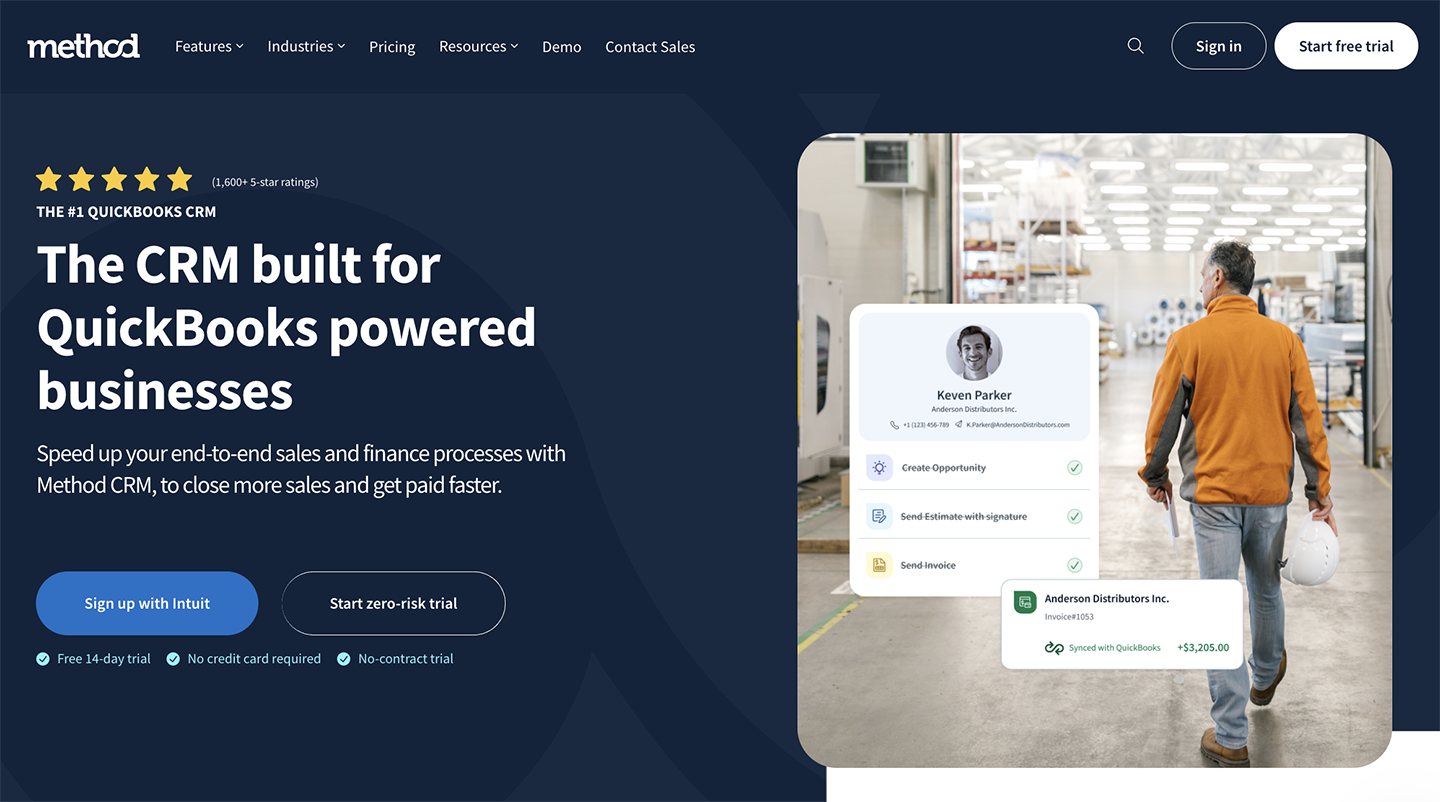
Method CRM is rated as the best CRM for small businesses using QuickBooks or Xero.
Here’s why.
Manage your leads in Method CRM, then automatically sync them to QuickBooks or Xero once they become paying customers to eliminate double data entry. This keeps your accounting data clean and secure while empowering your sales team to drive deals forward without QuickBooks or Xero access.
What’s more, deep integration with Gmail and Outlook allows you to take care of customers and leads with ease.
Key features
Method CRM makes it easy to manage all of your small business workflows with features such as:
- Automated new lead collection with web-to-lead forms
- Drag and drop workflow automation
- Instantly sync estimates to QuickBooks or Xero
- Online portals to serve your customers at any time
- 360-degree view of each customer including purchase history and interactions
Pros
- Powerful, two-way QuickBooks and Xero integrations
- Unlimited customization
- Reusable email, report and transaction templates
- Convert estimates into invoices in a few clicks
- Several third-party integrations, such as Gmail, Zapier and Outlook
Cons
- Only available in English
- Limited to QuickBooks and Xero users
Pricing
Method CRM has three pricing plans:
- Contact Management: $25 per user per month
- CRM Pro: $44 per user per month
- CRM Enterprise: $74 per user per month
Method CRM also offers a free trial with no credit card required.
2. Monday.com
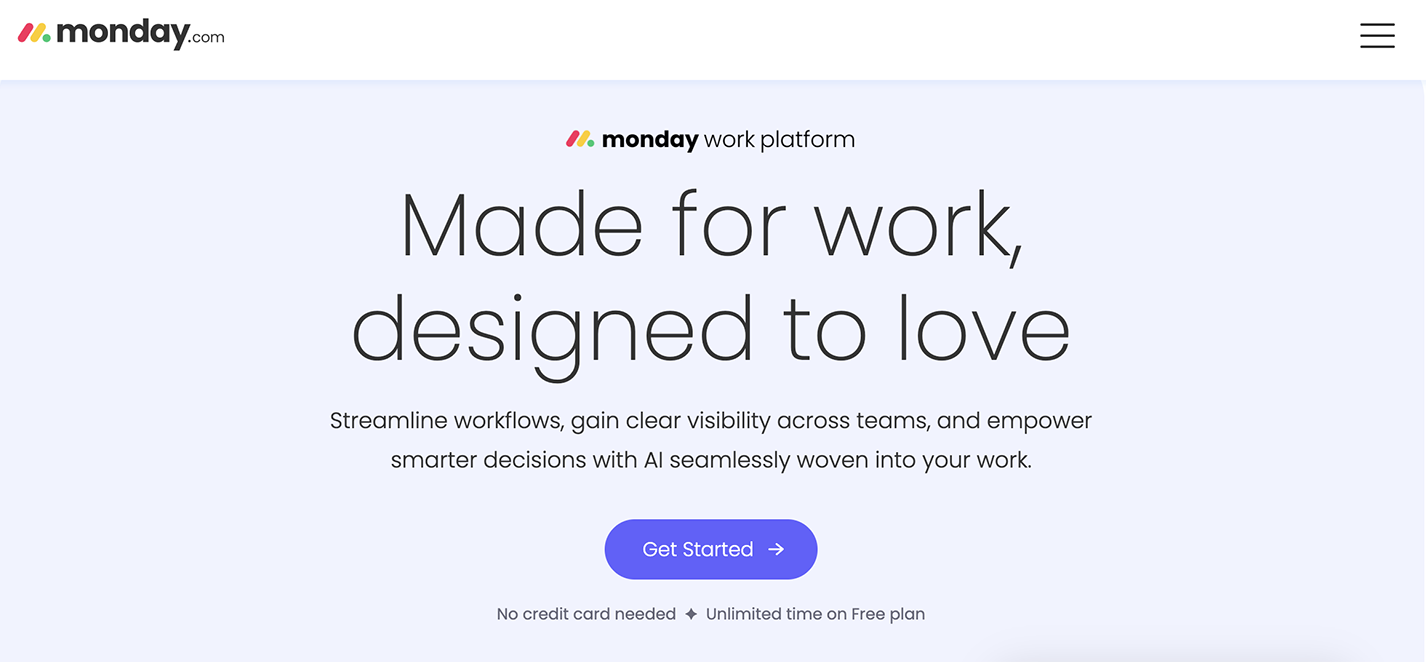
Monday Sales CRM is next on this best CRM system for small business list. It’s an intuitive and robust system that includes multiple functions in one platform, including task automation, sales pipeline tracking, and lead management.
Key features
- Import leads through integrations with multiple platforms
- Customizable Kanban boards and Gantt charts
- Simplified email marketing with integrations and automations
- Centralized communication to manage interactions with leads
- Send quotes and invoices to clients
Pros
- Intuitive user interface
- Great for collaboration
- All plans come with 24/7 support
Cons
- The UI offers a lot of information, which can be overwhelming for some users
- Recurrent performance issues
Pricing
Up to 2 users can use the free version of Monday with limited features. Beyond this, they offer four paid pricing plans:
- Basic: $10 per user per month
- Standard: $14 per user per month
- Pro: $24 per user per month
- Enterprise: Contact them
3. Zendesk Sell
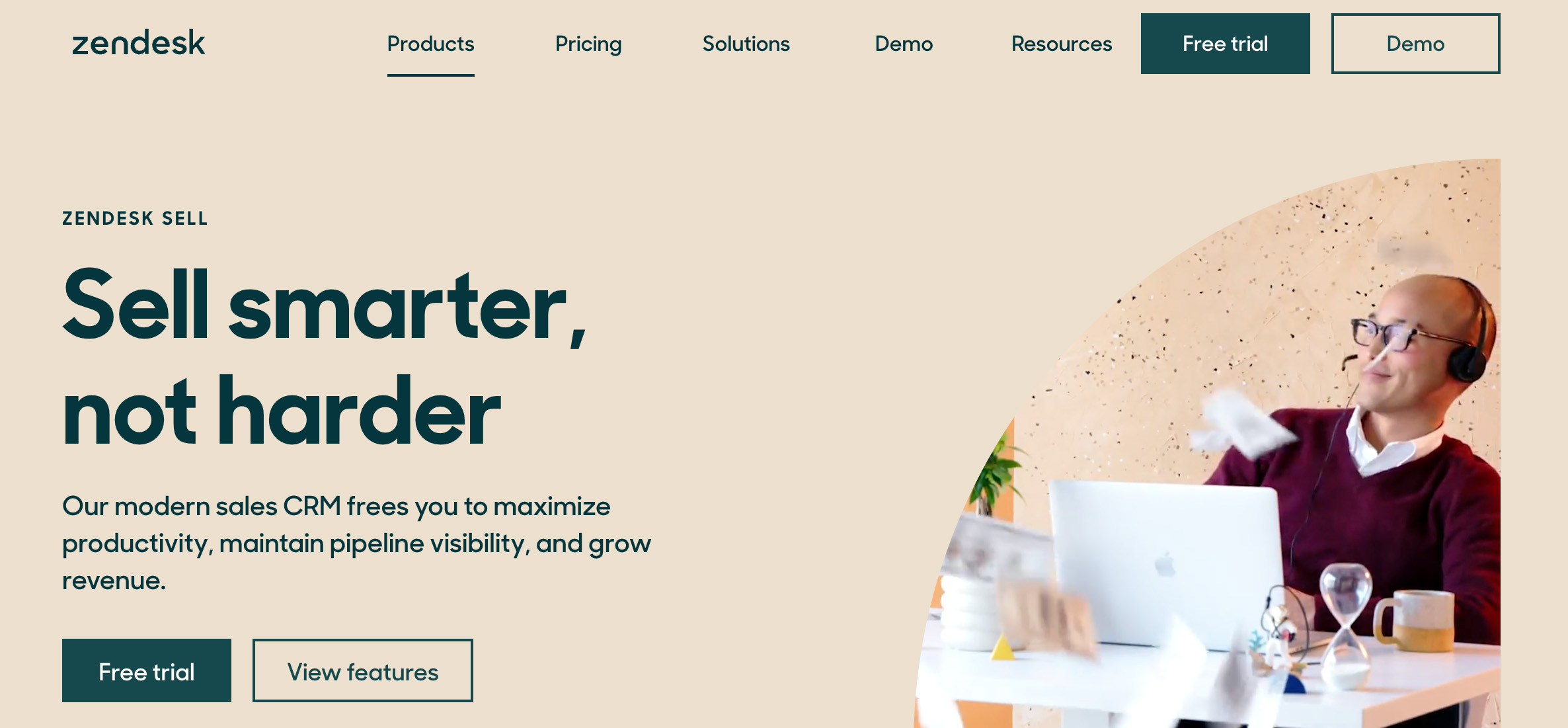
Zendesk Sell is built to boost workflow efficiency and close deals by tackling routine tasks efficiently. It helps small businesses improve productivity and visibility across the sales pipeline with everything from email tracking and activity reporting to task automation.
Key features
- Sales reporting and analytics metrics on a pre-built dashboard
- Email sync, alerts, templates and automatic tracking
- Connect popular tools through the Zendesk Marketplace with streamlined integration options
Pros
- User-friendly and easy to navigate
- Ability to set triggers to track incoming events
- Extensive time tracking options
Cons
- Costly for small to medium-sized businesses
- The number of options is overwhelming to new users
Pricing
Zendesk Sell has three pricing plans:
- Team: $19 per user per month
- Growth: $49 per user per month
- Professional: $99 per user per month
4. Insightly
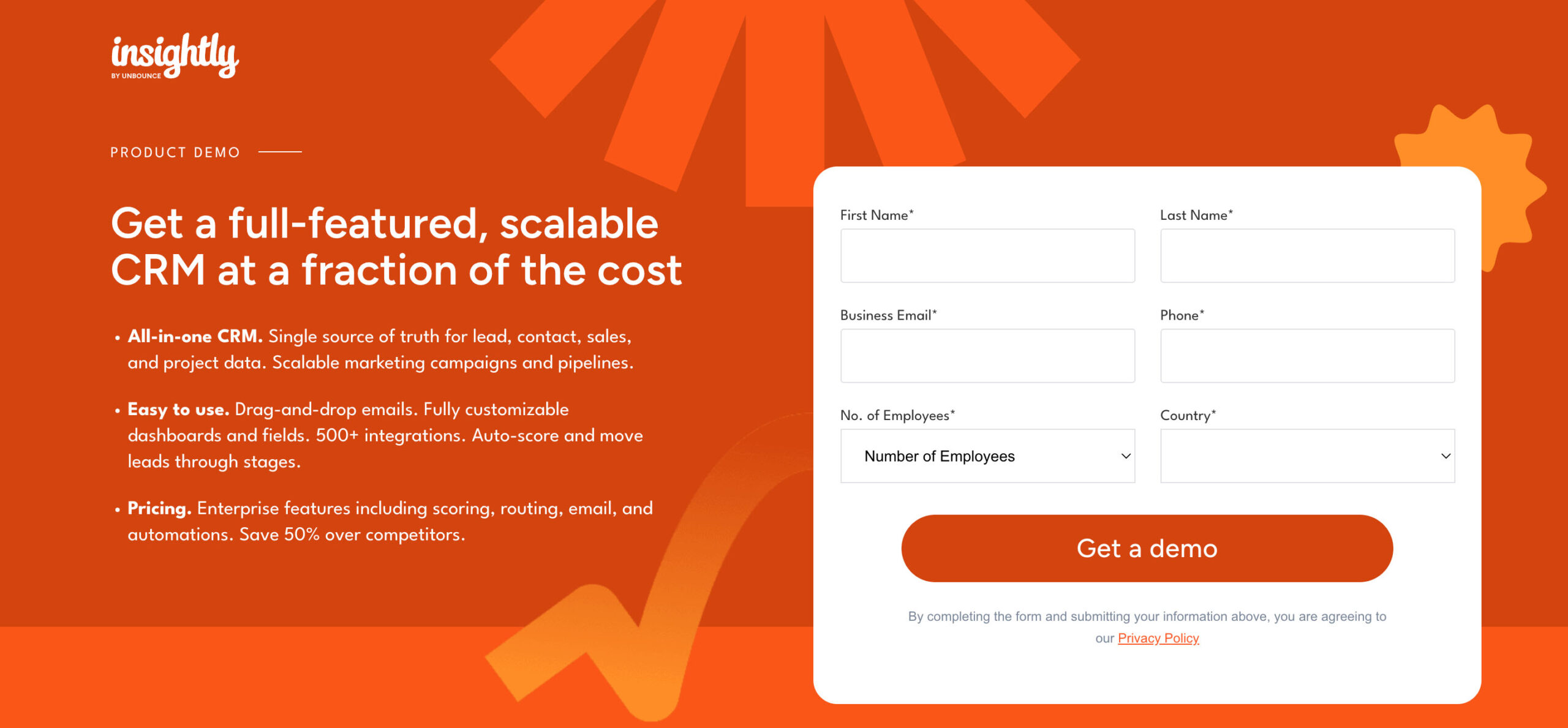
Insightly is a fully-customizable CRM that gives team members visibility into both client interactions and project progress within a single system. It is a unified CRM and project management platform that helps manage customer interactions and relationships, leads and sales pipelines.
Key features
- Ability to associate single contacts with multiple opportunities
- Create and customize onboarding sequences
- Dashboards and reports to keep track of projects
Pros
- Easy-to-use and navigate
- Reliable with no crashes and downtimes
Cons
- Poor connectivity to Outlook
- There is a lag time when editing accounts
- The user interface lacks customization flexibility
Pricing
The following pricing options are available from Insightly:
- Plus: $29 per user per month
- Professional: $49 per user per month
- Enterprise: $99 per user per month
5. Freshsales
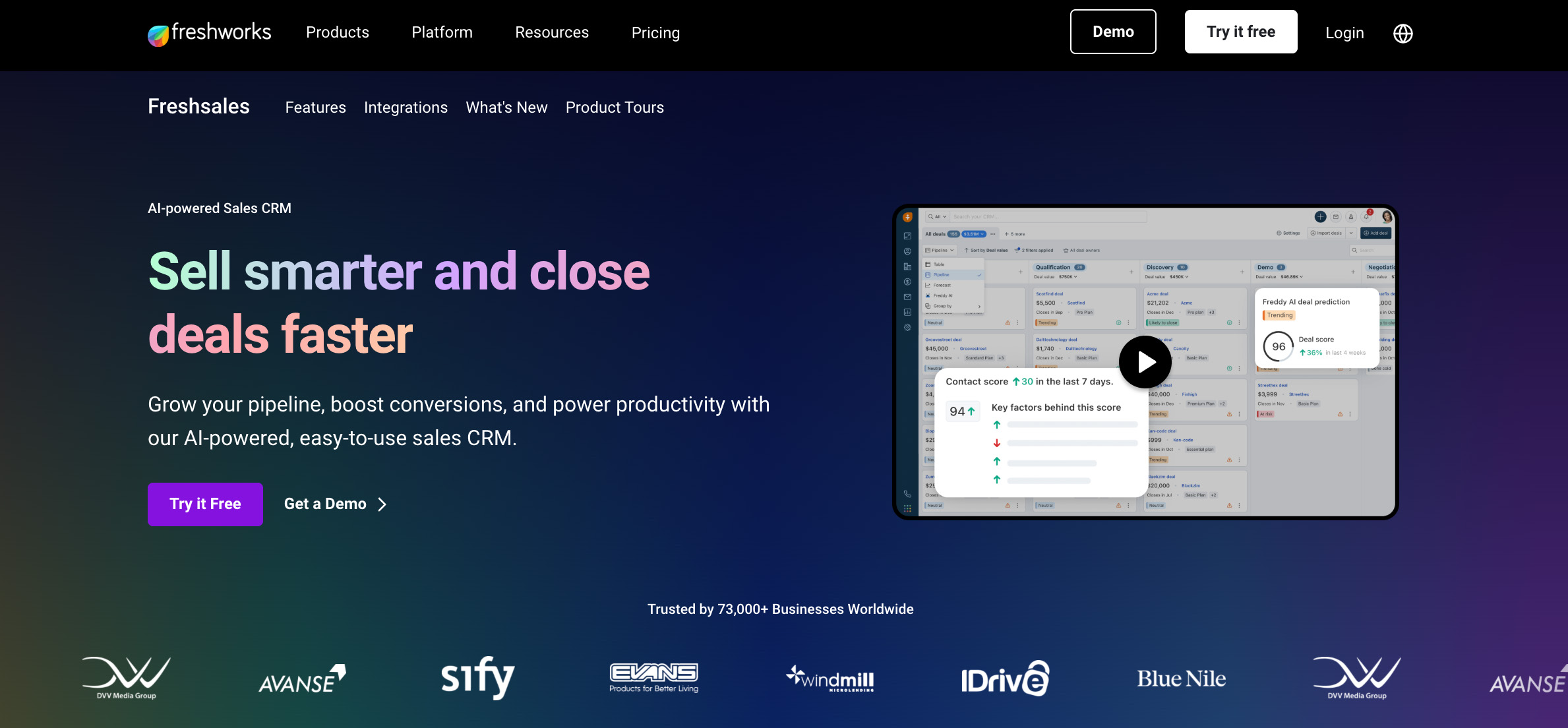
Freshsales (formerly known as Freshworks) is an all-in-one CRM system for small businesses that want to automate their workflows using powerful features. It helps businesses optimize their sales processes with AI-powered lead scoring and visual deal pipelines.
Key features
- Map your unique sales process with contact lifecycle stages
- Enrich your contacts and accounts with public information automatically
- Automated sales and marketing campaigns
- CRM data is viewable through their mobile app
Pros
- Clean and simple interface
- Multi-currency and multi-language for localized sales
- Extensive reporting
- Good customer service options, including AI assistant
Cons
- Fewer customization options than competitors
- Minimal social media integrations
- Strict limit of 1,000 contacts for marketing action
Pricing
Freshsales offers four pricing options:
- Free: $0 per user per month
- Growth: $18 per user per month
- Pro: $47 per user per month
- Enterprise: $83 per user per month
6. Salesforce CRM
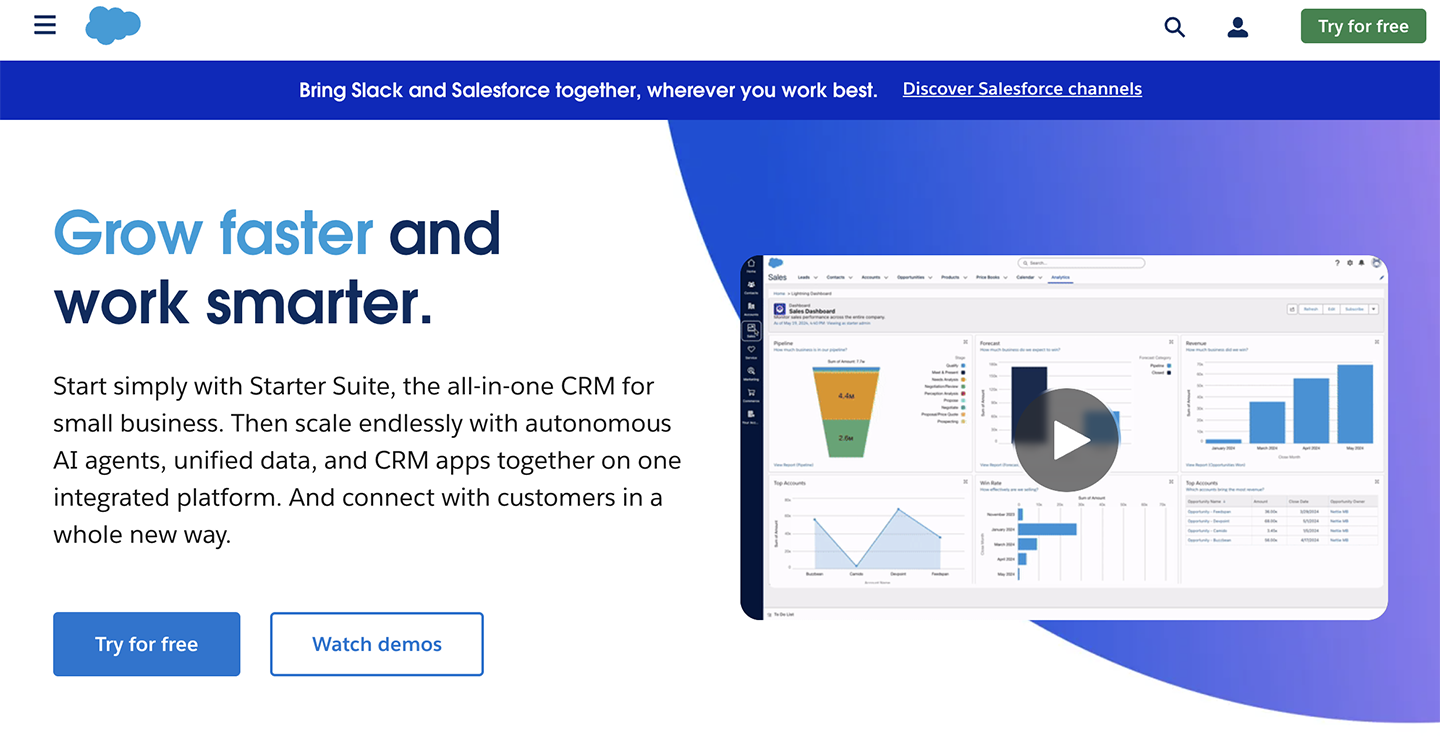
Salesforce CRM offers tools to track leads, automate workflows and gain insights that streamline operations and drive growth. It has built a trusted platform that goes beyond CRM with the following features.
Key features
- Customer 360 to support every customer touchpoint
- Artificial intelligence (AI) to completely automate business functions
- Track and manage campaigns across multiple channels
Pros
- Highly customizable software
- Great customer service experience.
Cons
- Low control over CRM upgrades and downtimes
- Can be difficult to use and set up
Pricing
Salesforce has a four pricing options to choose from:
- Essentials: $25 per user per month
- Professional: $75 per user per month
- Enterprise: $150 per user per month
- Unlimited: $300 per user per month
7. Pipedrive
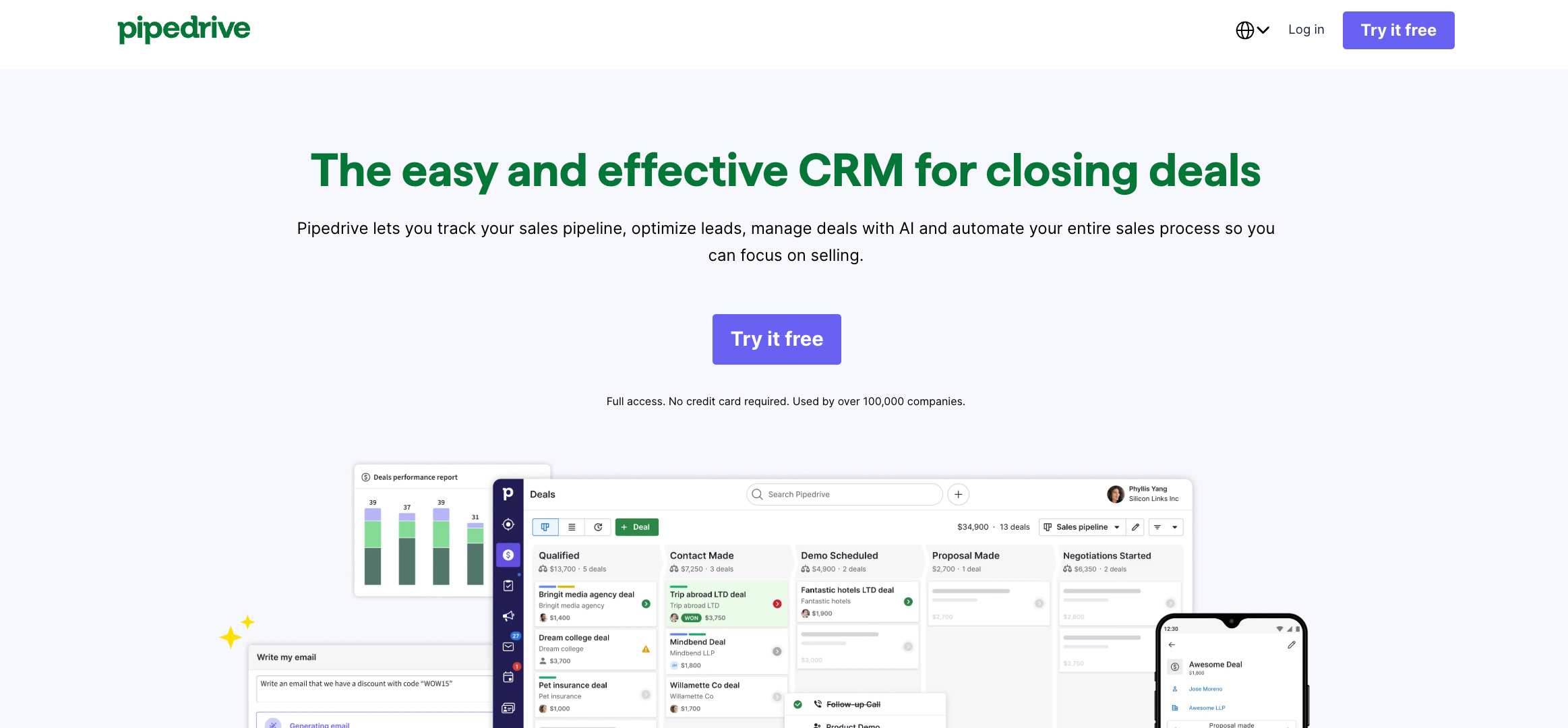
Next on this list of cloud based CRM systems for small businesses is Pipedrive. Pipedrive provides sales pipeline automation with an easy-to-use interface that allows you to customize visual sales pipelines.
Key features
- Chatbots to automate communication with web visitors
- A live overview of what your leads are doing
- Email segmentation to reach customers with tailored messages
- Multiple drag-and-drop pipelines
Pros
- Affordable paid plans
- Unlimited, customizable sales pipelines
- All plans include machine-learning-powered sales assistants
Cons
- Most plans have limited custom fields and reports
- Phone support is only available on the highest tier
Pricing
Pipedrive has four pricing plans:
- Essential: $14.90 per user per month
- Advanced: $24.90 per user per month
- Professional: $49.90 per user per month
- Enterprise: $99.00 per user per month
Pipedrive also offers a 14-day free trial.
8. Salesmate.io
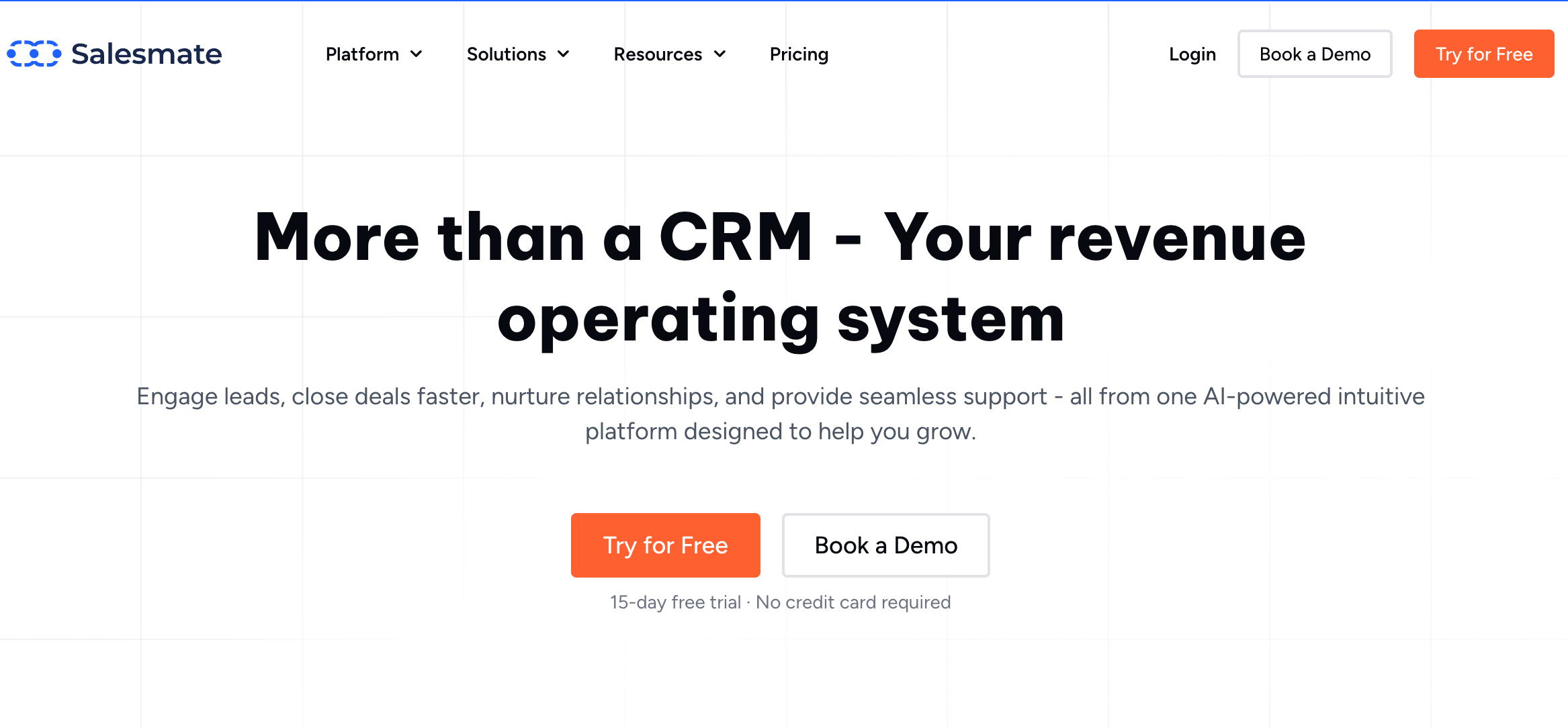
Salesmate is an all-in-one platform that centralizes sales and marketing, and supports workflows. This CRM is simple for every member of your team to use—whether they’re in sales, marketing, or customer support.
Key features
- Sales pipeline and activity tracking in real time
- Reusable sales playbook and automated cadences
- Automated and personalized follow ups
Pros
- Integrates with 700+ business apps
- Setup is very intuitive
- Easy-to-use
Cons
- Multiple redundant notifications distract users
- Chatbots are less advanced compared to dedicated chatbot platforms
Pricing
Salesmate has four pricing plans to choose from:
- Starter: $12 per user per month
- Growth: $24 per user per month
- Boost: $40 per user per month
- Custom: Contact them for more details
9. Less Annoying CRM
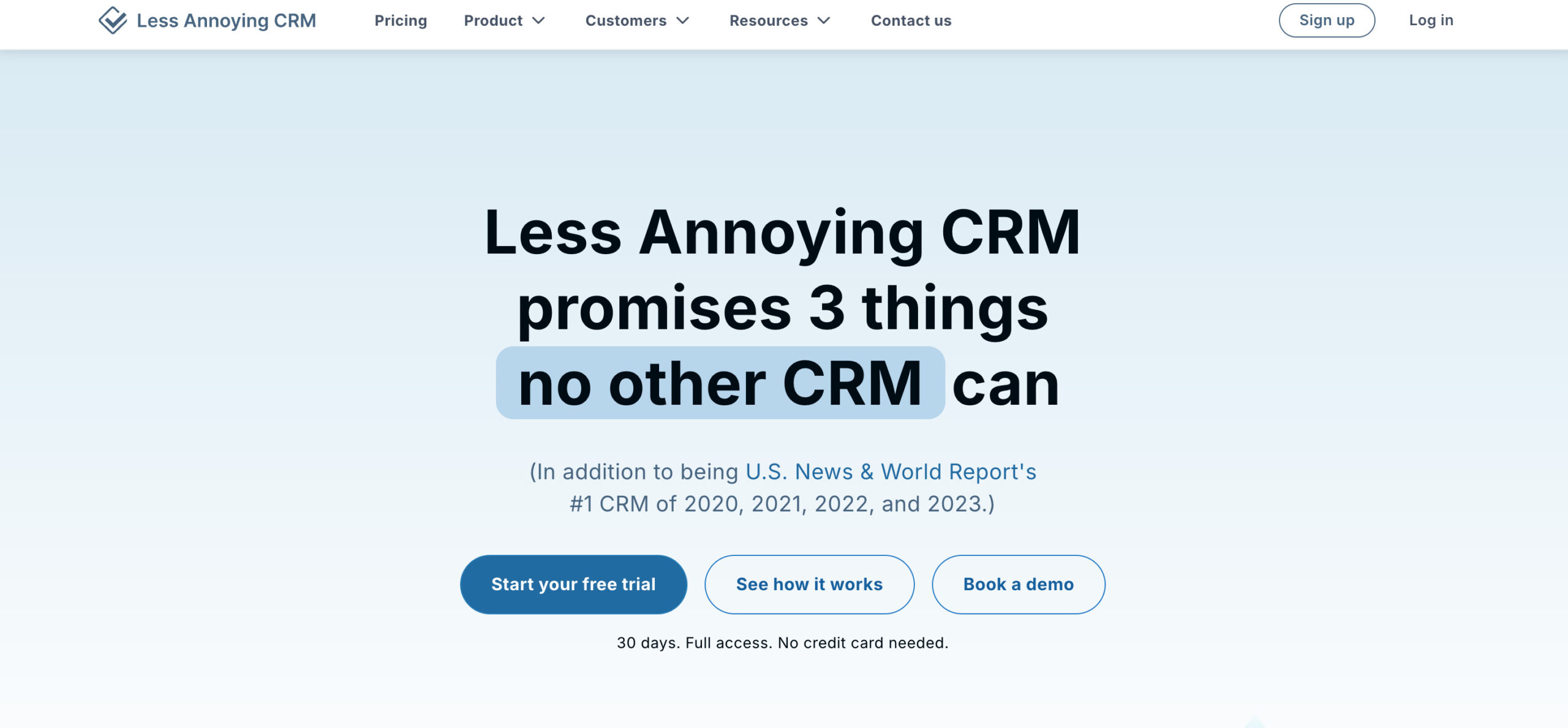
Less Annoying CRM is a straightforward, budget-friendly CRM designed for small businesses, offering easy contact and deal pipeline management alongside calendar and task tracking. Less Annoying CRM allows you to streamline business processes and manage follow-ups with simplicity and ease.
Key features
- Ability to customize your own fields
- Calendar and tasks built directly into the CRM
- Simple built-in reports
Pros
- Easy to navigate and use
- Intuitive user interface
- Quick and friendly customer support
Cons
- Limited integrations with apps
- Missing fields in the sales pipeline feature
Pricing
Less Annoying CRM is priced at $15 per user per month.
10. Keap
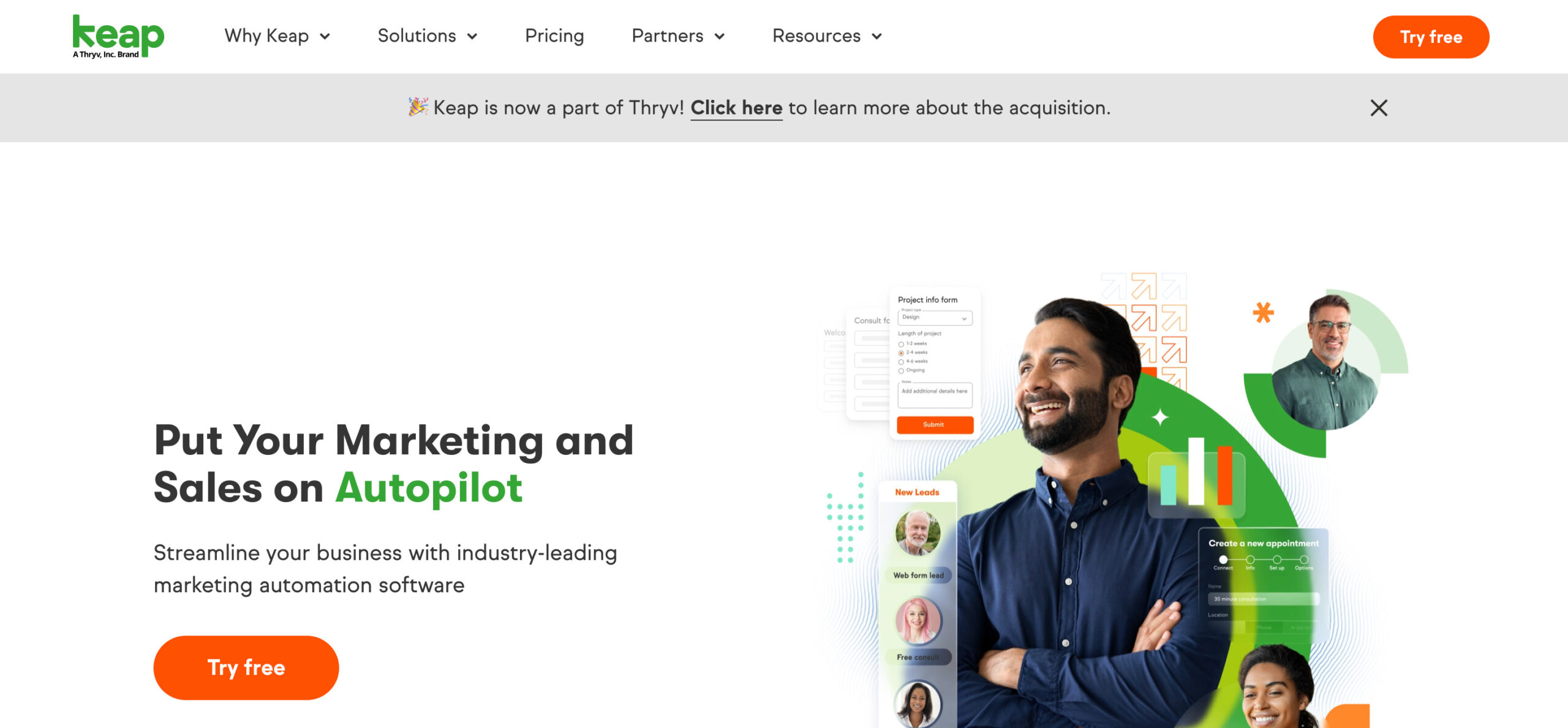
Keap’s powerful sales and marketing automation is ideal for small businesses that need to organize contacts, automate personalized marketing campaigns, and manage sales workflows.
Key features
- Automatically updates contact details as you submit new information
- Email and other marketing workflows triggered by client action
- Segment contacts using custom tags for different types and interactions
Pros
- Free trial and premium consulting available
- Comprehensive training on the system
- Reliable customer support including live chat
Cons
- Overly complex prospect nurturing and auto-marketing features
- Appointment setting feature could be more flexible
- Very contact-centric which makes it hard to manage B2B relationships
Pricing
On the Pro and Max plans, you’ll pay an additional $29 monthly for every extra user you add.
- Pro: $169 for 2 users per month.
- Max: $249 for 3 users per month.
- Max Classic: Contact them for pricing.
11. HubSpot
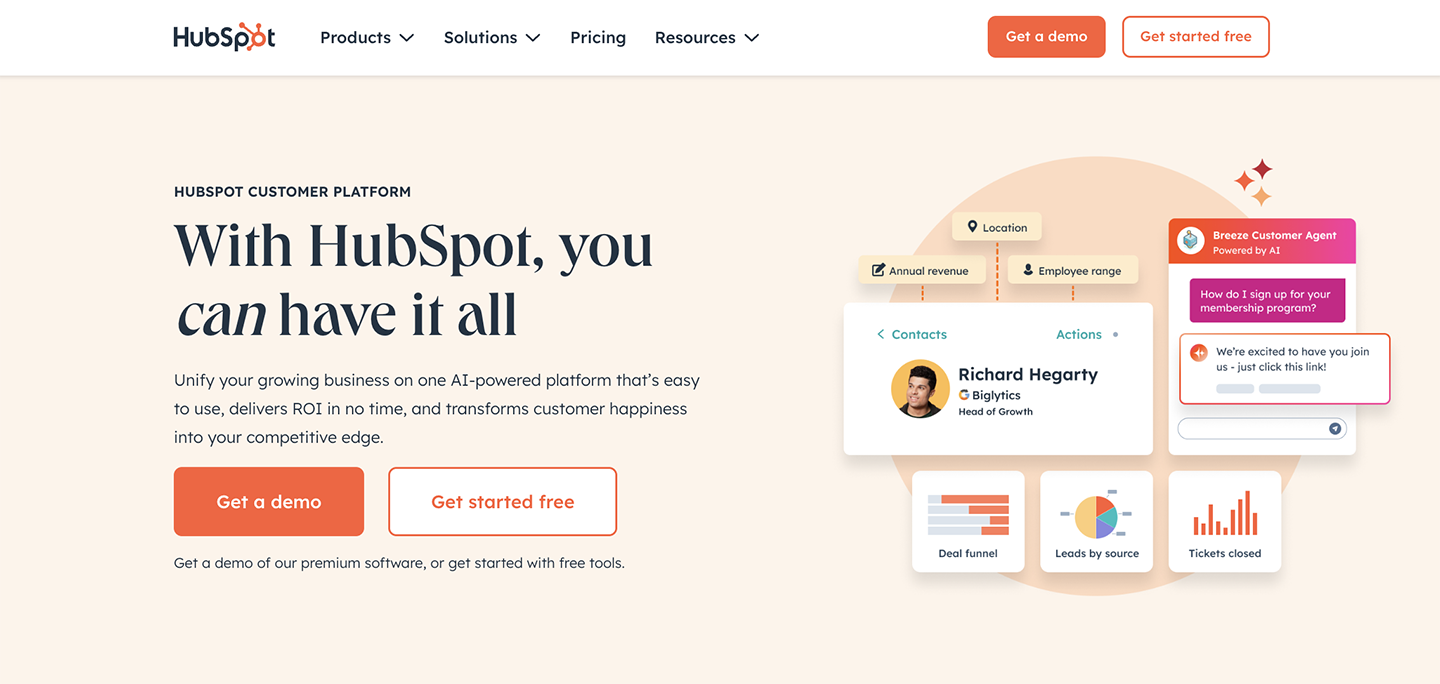
HubSpot is a cloud-based CRM that helps small business owners track contacts, automate marketing and sales tasks, and make informed business decisions. Its easy-to-use interface brings sales, marketing, and customer service into one place—making it great for both sales and marketing teams.
Key features
- Drag-and-drop pipelines that show exactly where each opportunity stands
- Email tools that allow you to send and schedule emails, and automate follow-ups
- Build custom reports to track sales activity, pipeline health, and marketing ROI
Pros
- Free CRM plan ideal for small teams just getting started
- User-friendly interface is known for its ease-of-use
- Combine sales, marketing, and service tools without juggling multiple subscriptions
Cons
- Lacking customization for pipelines or dashboards unless you upgrade
- Add-ons and additional users can add to the monthly costs
Pricing
HubSpot offers the following pricing:
- Free: Always free
- Starter: $20 per user per month
- Professional: $100 per user per month
- Enterprise: $150 per user per month
12. Zoho CRM
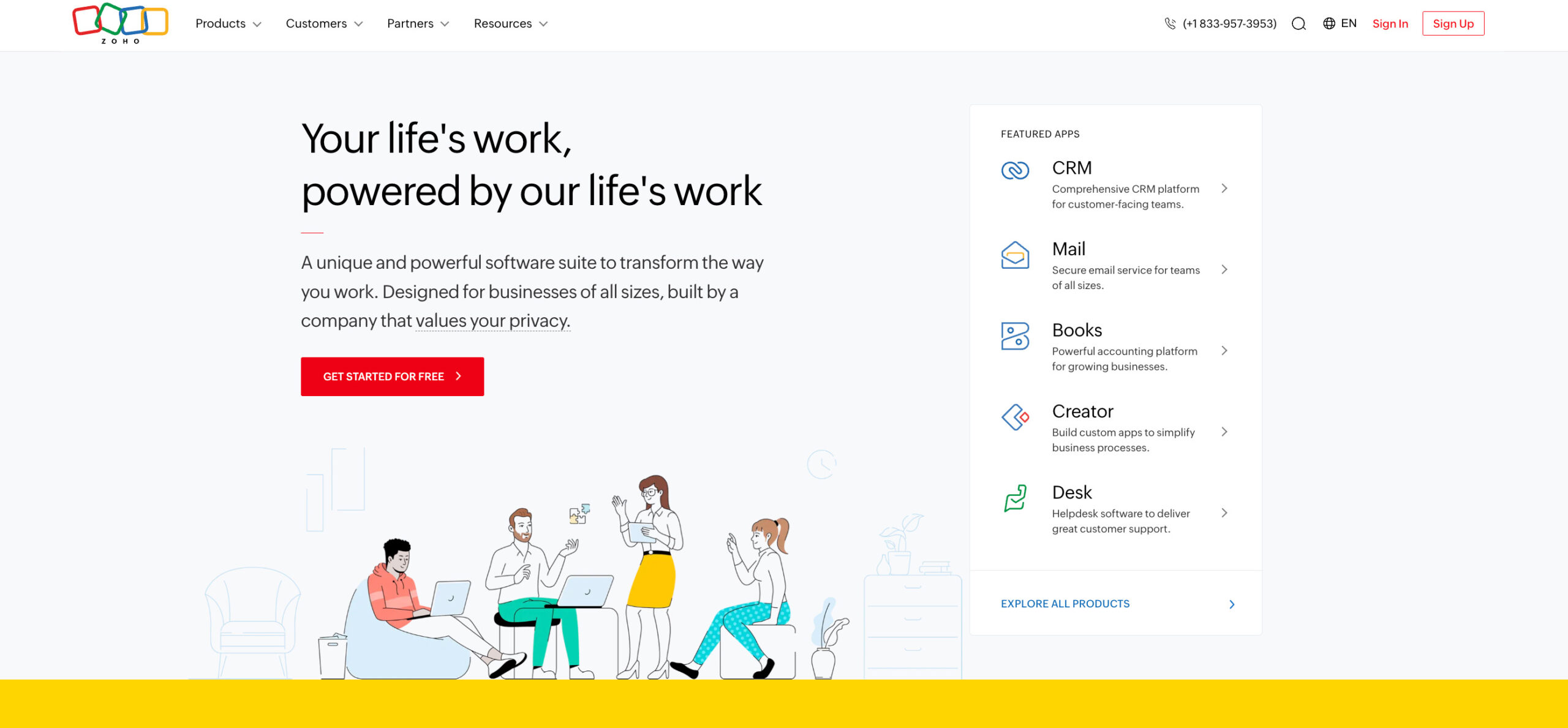
Zoho CRM is a cloud-based CRM tool that offers automations, analytics, and integrations to help teams do everything from sales management to running marketing campaigns.
Key features
- Automate repetitive tasks like follow-up emails, task assignments, and alerts
- Build custom dashboards and reports to monitor sales performance and pipeline health
- Centralize customer data, track interactions, and score leads automatically
Pros
- Competitively priced plans and a free plan for up to three users
- Customizable system that fits your unique sales process
- Connects with hundreds of third-party apps like Google Workspace, Mailchimp and Zapier
Cons
- The interface can be difficult to manage
- Tools like AI predictions and multi-currency support are available at a higher cost
- Customization and advanced setup can take time and technical know-how
Pricing
Zoho CRM offers a free plan for up to three users. Other plans include:
- Standard: $14 per user per month
- Professional: $23 per user per month
- Enterprise: $40 per user per month
- Ultimate: $52 per user per month
Which CRM solution is best for your small business?
Now that you’ve taken a look at the best CRM systems for small businesses, you may be wondering which one is right for you.
Well, that choice will depend on your priorities and business needs.
Method CRM is a popular choice for a CRM system because it:
- Allows you to stay in contact with your best customers
- Offers a two-way, real time sync with QuickBooks and Xero
- Automates your workflows
Ready to see how Method CRM can support your business?
Start your free trial today—no credit card required.
CRM system for small business FAQs
Which is the best CRM software for small businesses?
The best CRM software for small businesses depends on the size, scope, and budget constraints of your business.
However, there are some crucial qualities to look out for, which include:
- Being fully customizable
- Easy to learn and set up
- Flexible as your business grows
- Collaborative for your team
- Seamlessly connects with other platforms
For example, Method CRM is the best CRM software for QuickBooks and Xero users because of its two-way, real-time sync with these accounting platforms.
For businesses on QuickBooks and Xero, Method CRM offers a 360-degree view of finances from the first touch with a lead. Then, when your leads turn into repeat customers, enjoy features like:
- Automated nurture campaigns
- Detailed transaction history
- Quick and easy payments
What is the best simple CRM?
There is no one-size-fits-all solution when it comes to choosing the best simple CRM system. It all depends on your needs and preferences.
However, your choice should include core CRM features and have straightforward pricing to reduce confusion.
It should also be user-friendly, with reliable customer service as well as reporting features. The best simple CRM system for small business does not require much technical expertise and is easy to set up.
Is CRM useful for small businesses?
Having a good CRM system can make or break your business.
The best CRM systems for small businesses act as the central source for client data and interactions.
It becomes easy to track data and personalize the whole customer experience. As a result, it improves your sales and revenue while building customer loyalty.
What’s more, the best CRM systems for small businesses do more than just track sales. It connects seamlessly with marketing and customer service teams to give you a 360 degree view of your customer’s experience.
Make CRM a part of your strategy with a free trial of Method CRM.




